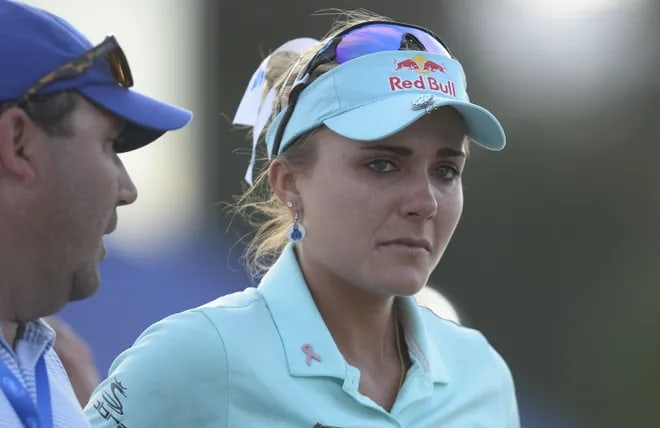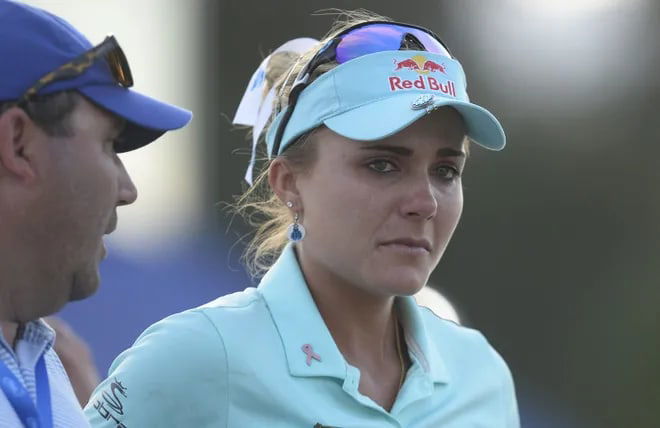
Imago
April 2, 2017; Rancho Mirage, CA, USA; Lexi Thompson reacts following her loss in playoff against So Yeon Ryu during the final round of the ANA Inspiration golf tournament at Mission Hills CC – Dinah Shore Tournament Cou.

Imago
April 2, 2017; Rancho Mirage, CA, USA; Lexi Thompson reacts following her loss in playoff against So Yeon Ryu during the final round of the ANA Inspiration golf tournament at Mission Hills CC – Dinah Shore Tournament Cou.

Imago
April 2, 2017; Rancho Mirage, CA, USA; Lexi Thompson reacts following her loss in playoff against So Yeon Ryu during the final round of the ANA Inspiration golf tournament at Mission Hills CC – Dinah Shore Tournament Cou.

Imago
April 2, 2017; Rancho Mirage, CA, USA; Lexi Thompson reacts following her loss in playoff against So Yeon Ryu during the final round of the ANA Inspiration golf tournament at Mission Hills CC – Dinah Shore Tournament Cou.
Back in 2014, a 19-year-old Lexi Thompson stood on the 18th green at Mission Hills Country Club, hoisting the Kraft Nabisco Championship trophy above her head. The victory made her the youngest major champion since 1986. Her final-round 68 was flawless—bogey-free and brilliant. That moment represented everything golf meant to her: pure competition, relentless pursuit, and the drive to win. Then came her most heartbreaking moment: semi-retirement from 2025. She knew this would come with less competition, but didn’t know what it would mean mentally.
Watch What’s Trending Now!
“It’s been hard to shut off my mind kind of a bit and being like, all right, it’s OK to take a few days off here and there,” Thompson confessed to Vanessa.
She was sharing her unfiltered thoughts about stepping back from that intensity in an interview with Vanessa Welch on Empower’s YouTube channel. Her candid admission reveals the internal struggle many athletes face when scaling back their careers.
The 30-year-old golfer turned professional at the age of 15. She has competed at the highest level for her entire adult life. This makes the adjustment to part-time competition particularly challenging. Thompson emphasized that the transition requires constant mental recalibration.
“I’m still training. I’m still practicing because when I do tee it up, I want to go out there and win,” she explained.
Thompson’s 2025 season reflects this selective approach perfectly. She played only 11 events compared to a typical full-time schedule of 20-25 tournaments. Her earnings of $681,600 represent a significant decrease from her peak years. However, the financial sacrifice comes with mental health benefits she desperately needed.

Imago
April 24, 2025, The Woodlands, Texas, USA: LEXI THOMPSON USA tees off on the 2nd hole during the first round of the 2025 Chevron Championship at The Club at Carlton Woods in The Woodlands, Texas, on Thursday, April 24, 2025. The Woodlands USA – ZUMAp213 20250424_znp_p213_100 Copyright: xLynnxPenningtonx
The balancing act extends beyond just tournament preparation. Thompson must now manage household responsibilities, training schedules, and travel logistics differently.
“There’s a lot that goes into it. Taking care of the house and everything, I’m lucky I have a few people around me that do help me out when I’m traveling,” she acknowledged.
Meanwhile, Thompson clarified her retirement status after widespread confusion. She admits acknowledging that she “never used the word retire” and “probably shouldn’t have said that” about her initial announcement. This clarification came after Thompson faced constant speculation about her career intentions throughout 2025.
Thompson is joined by other LPGA players stepping back from the game earlier than previous generations.
How Stacy Lewis and Michelle Wie West handled LPGA career transitions
Stacy Lewis recently retired at age 40, stating, “My body has told me it’s time.” Lewis pioneered the balance between motherhood and professional golf when KPMG provided groundbreaking paid maternity leave in 2018.
Michelle Wie West made a similar transition in 2022 at age 33. She stepped away from full-time competition. Wie West now focuses on family life and brand partnerships with Nike.
“I’m so grateful for the past 14 years I spent on tour, traveling the world and competing against the best in the game,” she explained.
The statistics paint a striking picture of this trend. Thirteen players retired from full-time competition in 2024, with six being 34 or younger. Brittany Lincicome observed that “for myself and my generation, somebody playing for 20 years is a thing of the past.”
Thompson’s journey mirrors broader changes in women’s professional golf. International players now dominate the sport, capturing all five major championships in 2025. This competitive evolution makes consistent success increasingly difficult for established American stars.
Thompson’s honest reflection on the challenges of semi-retirement will resonate with many athletes facing similar crossroads. Her willingness to prioritize mental health over traditional career expectations sets an important precedent. The golf world continues watching her navigate this delicate balance between competition and personal fulfillment.


